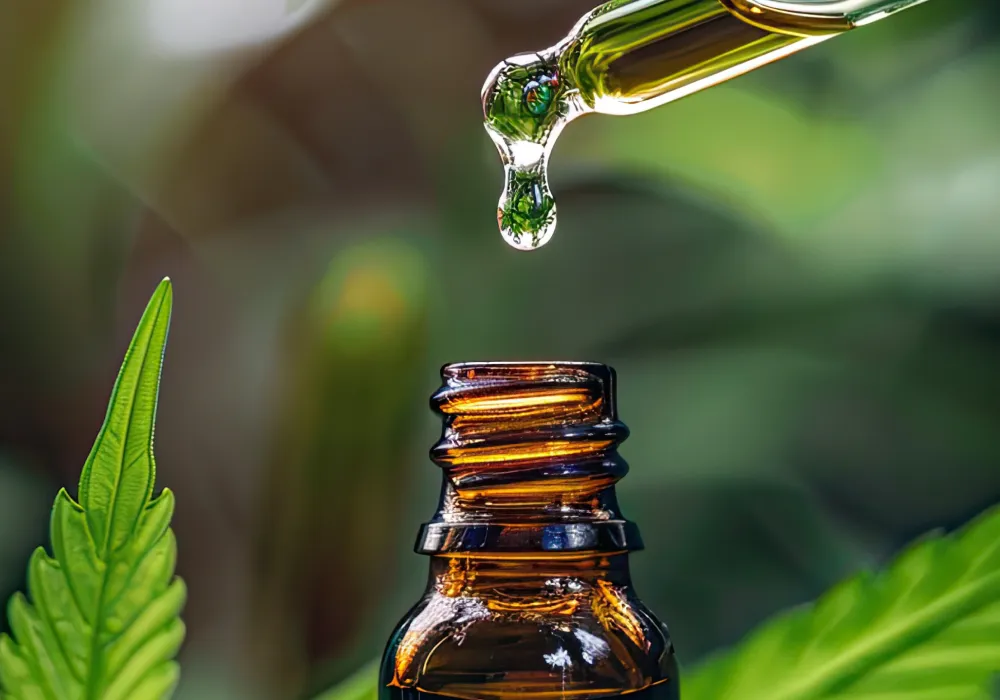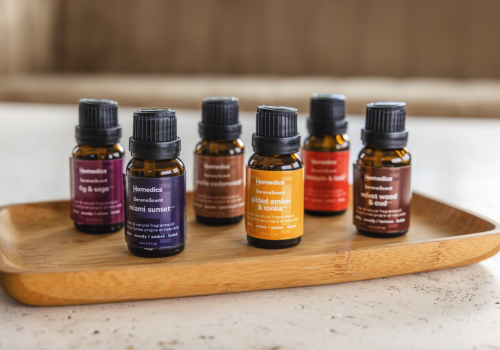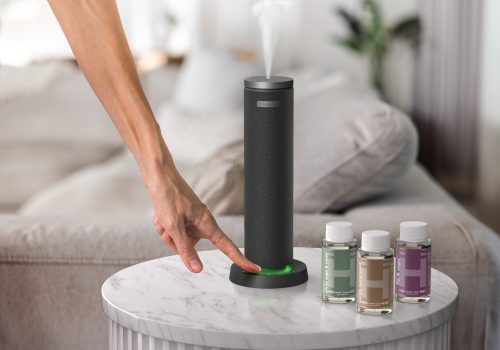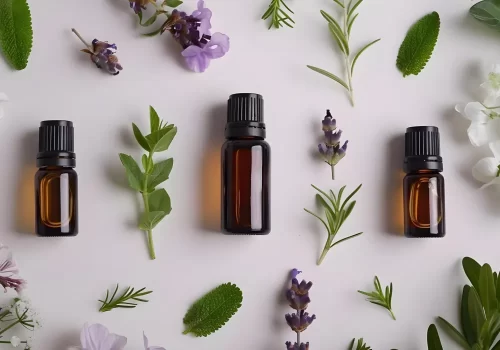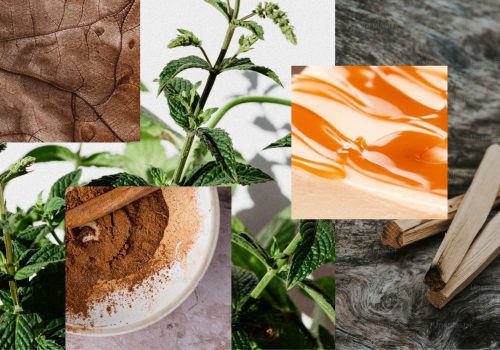How Do You Use Aromatherapy Oils?
A Comprehensive Guide to Using Aromatherapy Oils
When creating the perfect ambiance in your home, you may consider factors like lighting, temperature, and visual layout. But there may be one very important element that you’re forgetting: smell. Whether it’s the scent of vibrant, zesty citrus or freshly baked cookies, smell can have a significant impact on how you feel.
So, what can you do to ensure that your home, bedroom, or workspace is a place where you feel like your best self? Give aromatherapy a try. Holistic aromatherapy is a wellness tool that’s been used for centuries by various cultures around the world.
In this guide, we’ll break down what aromatherapy is, how it works, and how to use aromatherapy oils to benefit your mind, body, and space.
How Does Aromatherapy Work?
Aromatherapy is a holistic wellness practice that incorporates essential oils — concentrated extracts from plants, including roots, seeds, and leaves.
Every essential oil contains a unique mix of ingredients, giving each one a different scent along with potential healing properties. While further research is needed to fully understand the impact of essential oils on physical health, some people use essential oils to treat swelling, skin infections, and other topical conditions.
More commonly, however, essential oils are used for aromatherapy, which involves breathing in the scent of the oil to evoke a particular physical, mental, or emotional response.
Through your olfactory nerves (found in your nose), scent molecules travel to areas of your brain, like the hippocampus and amygdala, that store memories and emotions. This is why inhaling essential oils can have positive impacts on your physical and mental state, inducing calmness, happiness, or enhanced energy.
How Do You Use Aromatherapy Oils?
Are you ready to start your aromatherapy journey? If so, there are several methods you can use to enjoy the smell and leverage the benefits of your essential oils:
Directly Inhale the Oils
If you want to reap the benefits of essential oils, the easiest way to do so is by simply inhaling them. Remove the cap from the bottle of essential oils and hold it a few inches away from your face. Then, take a deep breath and enjoy the scent.
When using undiluted oils, make sure they don’t come in contact with your skin as they may cause skin irritation.
For a more relaxing experience, you can also inhale your oils using the steam method. This involves filling a bowl full of hot water and adding a few drops of one or more essential oils to the bowl. Then, follow these steps:
- Cover your head with a towel
- Stand over the steaming hot bowl
- Close your eyes and slowly inhale
Repeat this process for several minutes to receive the full effects of the aromatherapy oils, especially if you’re inhaling them for a specific purpose. This method can provide a more potent scent than simply inhaling from the essential oil bottle itself.
Use the Dry Evaporation Method
Another approach to aromatherapy is using slow, dry evaporation. This method requires dry materials like cotton balls or fabric. Simply apply a couple of drops of oil to the material, and hold it to your nose to inhale it.
If you apply the oils to a larger surface, like a pillowcase or blanket, you may notice the scent of the oil when using the item. This can be a particularly helpful strategy when you want to use aromatherapy for relaxation or to aid with sleep.
Alternatively, you can add the cotton balls or pieces of fabric to the vents in your car or other common areas to disperse the smell slowly. This can be an easy and cost-effective way to enjoy your favorite oils, although you’ll want to keep in mind that as soon as the oils fully evaporate, you’ll need to apply more to take in the scent again.
Add Them to Your Shower or Bath
If you want to boost the benefits of taking a hot bath or shower, consider adding essential oils. While you’ll want to store your essential oils outside of your bathroom (since they can be sensitive to high humidity levels and heat), they can make for a great addition to your hygiene and self-care rituals.
For example, you can add a few drops of oil to the wall of your shower or bath before you get in. As the steam from the water interacts with the oils, their smell will disperse and you can enjoy an invigorating aromatherapy experience. If you want to add your oils directly to your bathwater, make sure to dilute them with a carrier oil first since certain essential oils are too concentrated to touch your skin safely.
While you’re in the bathroom, you may also consider adding essential oils to your hair care products, like your shampoo and conditioner, or to your body wash. Make sure to only use a few drops so the oils don’t overpower the other active ingredients in your bath items, and be especially careful if you have sensitive skin.
How to Dilute Your Essential Oils
One of the advantages of using essential oils is their potency—you only need a few drops to create a lasting smell in your home, during a bath, or on fabrics. However, their intensity also makes many of them unsafe to use directly on your skin without diluting them.
Diluting essential oils means mixing them with a different carrier oil, like coconut, grapeseed, or vitamin E oil. This makes them safe to apply to your skin.
Here are a few simple tips for safely and effectively diluting your oils and getting the most out of your aromatherapy practice:
- Choose the right carrier oil for your skin – When deciding on a carrier oil, you’ll want to keep the oil’s properties and your skin type in mind. For example, if you have naturally dry skin, try opting for a lightweight oil, like grapeseed. Or, if you want to use certain essential oils during a massage, go for one with a high viscosity level, like jojoba oil.
- Use a safe ratio – While the exact measurements can vary depending on the oils you use, it’s typically a good idea to add two drops of essential oil for every teaspoon of carrier oil you use. This allows you to adequately dilute your favorite essential oil while maintaining the scent and integrity of the ingredients.
- Ensure your carrier oil doesn’t overpower the scent – Another key factor to keep in mind when deciding which carrier oils and essential oils to mix is smell, since certain carriers may have more potent scents. For example, if you want to use coconut oil, try to choose an essential oil that will cover or complement the oil’s tropical undertones.
When it comes to diluting oils, always err on the side of caution and stick to a 2–3% dilution ratio. This means that for every 10ml of carrier oil, only use 5 drops of an essential oil to ensure safe topical application to your skin.
Upgrade Your Aromatherapy Experience with a Diffuser
While you may be able to add essential oils to your shower or a piece of fabric, using a tool like a diffuser allows you to get the most out of these potent scents. So, when you’re ready to take your aromatherapy experience to the next level, a diffuser is the way to go.
Aromatherapy diffusers ensure the oils are spread evenly throughout your space and can help create a longer-lasting smell for you to enjoy.
Using a diffuser may also make it easier for the molecules in the oils to pass through your olfactory nerves and reach the parts of the brain that act as storage centers for your emotions and memories, allowing for even greater benefits.
What Are the Benefits of Using Essential Oils?
Do essential oils work? Scientists continue to study the potential healing powers of essential oils, so more research is needed to understand the extent of their health benefits and medicinal properties. However, there is some research that indicates essential oils may be able to:
- Provide a mood boost – When you’re looking for a pick-me-up, you may gravitate toward a cup of coffee, exercise, or a sweet treat. Another way to get a mood boost is through aromatherapy, which may create feelings of satisfaction, fulfillment, and excitement depending on the scent you choose.
- Promote a sense of relaxation and calm – If you want to unwind, consider adding a few drops of a calming scent to your shower or essential oil diffuser. These scents for relaxing can help encourage slow, intentional breaths which slow your heart rate and allow you to feel more grounded. This can be particularly helpful during times of stress and overwhelm.
- Combat feelings of sadness and unease – Recent studies indicate that the use of essential oils for aromatherapy may be able to combat feelings of sadness and anxiety by acting on the central nervous system in the body. When used in combination with other healing techniques, essential oils may help regulate your emotions and help you feel more at ease.
Bring the Power of Aromatherapy to Your Home with Homedics
When you’re ready to enhance your self-care routine, consider introducing aromatherapy and essential oils to your home.
While aromatherapy is a calming practice that you can easily integrate into your everyday routine, not all essential oils are created equal. Fortunately, when you shop the Homedics SereneScent collection, you can rest assured that you’re getting the very best. This is because all of our essential oil blends are 100% plant-based, cruelty-free, and USDA-certified as bio-based products. Simply add them to one of our waterless diffusers, and you can transform your home, bedroom, or workspace into a calming, energizing, or mood-boosting environment.
Shop Homedics today to bring the power of aromatherapy to your life.
Sources:
John Hopkins Medicine. Aromatherapy: Do Essential Oils Really Work? https://www.hopkinsmedicine.org/health/wellness-and-prevention/aromatherapy-do-essential-oils-really-work#:~:text=What%20Is%20Aromatherapy%3F,emotional%20center%20of%20the%20brain.
National Library of Medicine. Effects of odor on emotion, with implications. https://www.ncbi.nlm.nih.gov/pmc/articles/PMC3794443/
National Library of Medicine. Immunological and Psychological Benefits of Aromatherapy Massage.https://www.ncbi.nlm.nih.gov/pmc/articles/PMC1142199/

